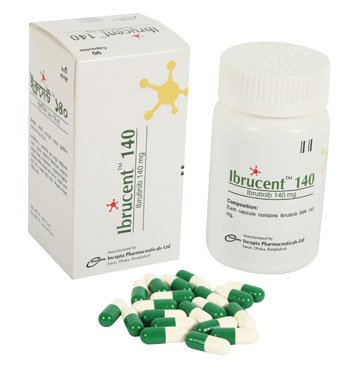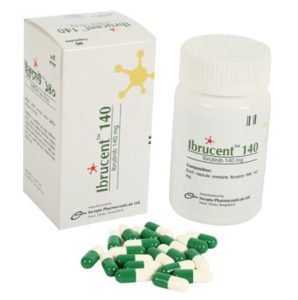Ibrutinib 140 MG: A Comprehensive Guide to Understanding Its Uses, Benefits, and Safety
Mohammad Jewel
24 Mar, 2025

Summary:
Ibrutinib 140 MG, marketed as Ibrucent, is a critical medication for managing certain types of cancers, specifically mantle cell lymphoma. This guide provides a detailed overview of Ibrutinib, its mechanism of action, therapeutic uses, dosage, potential side effects, and essential safety considerations. We’ll delve into its pharmacology, interactions with other drugs, and address common concerns to help patients and caregivers make informed decisions.

Buy Ibrutinib 140 mg
Table of Contents
Understanding Ibrutinib 140 MG
Navigating a cancer diagnosis can be overwhelming, and understanding the medications involved is crucial. “Ibrutinib 140 MG,” a key treatment option, offers hope for individuals battling specific types of blood cancers. This article aims to demystify Ibrutinib 140mg, providing a clear and comprehensive overview of its uses, benefits, and safety considerations. We’ll explore its role in managing mantle cell lymphoma and other related conditions, ensuring you have the information needed to engage in informed discussions with your healthcare provider.
Medicine Overview: Ibrutinib 140 MG
Ibrucent, containing Ibrutinib 140 MG, is a medication manufactured by Incepta Pharma Ltd. It’s formulated as capsules, each containing 140mg of Ibrutinib. This medication is primarily indicated for the treatment of mantle cell lymphoma. Ibrutinib 140mg is a small-molecule inhibitor of Bruton’s tyrosine kinase (BTK). It’s crucial to store this medication below 30°C to maintain its efficacy.
Descriptions
Ibrutinib 140 Mg is a small-molecule inhibitor of BTK. Ibrutinib forms a covalent bond with a cysteine residue in the BTK active site, leading to inhibition of BTK enzymatic activity. BTK is a signaling molecule of the B-cell antigen receptor (BCR) and cytokine receptor pathways. BTK’s role in signaling through the B-cell surface receptors results in activation of pathways necessary for B-cell trafficking, chemotaxis, and adhesion. Nonclinical studies show that ibrutinib inhibits malignant B-cell proliferation and survival in vivo as well as cell migration and substrate adhesion in vitro.
To read more visit: Incepata pharma In bellow we have Presentation, Descriptions, Indications, Dosage & Administration, Side Effects, Precautions. Buy ibrutinib 140 mg (Ibrucent) only $246. To know more about the product visit Contact Us page.
Buy Ibrucent (Ibrutinib) 140 mg capsules 90’s Only $246
Presentation
Ibrucent 140: Each capsule contains Ibrutinib INN 140 mg
Ibrutinib is a small molecule that acts as an irreversible potent inhibitor of Burton’s tyrosine kinase. It is designated as a targeted covalent drug and it presents a very promising activity in B cell malignancies.4 Ibrutinib developed by Pharmacyclics Inc and in November 2013 was FDA-approved for the treatment of mantle cell lymphoma. February 2014, ibrutinib approved for the treatment of chronic lymphocytic leukemia and it indicate for the treatment of patients with Waldenström’s Macroglobulinemia. Ibrutinib has also approved by the EMA for the treatment of chronic lymphocytic leukemia and mantle cell lymphoma.
Indications
Ibrutinib, is a kinase inhibitor indicate for the treatment of patients with:
Mantle cell lymphoma (MCL) who have received at least one prior therapy. Accelerated approval was granted for this indication base on overall response rate. Continued approval for this indication may be contingent upon verification of clinical benefit in confirmatory trials.
Chronic lymphocytic leukemia (CLL) who have received at least one prior therapy.
CLL with 17p deletion.
Waldenström’s macroglobulinemia (WM).
Dosage & Administration
MCL: 560 mg taken orally once daily (four 140 mg capsules once daily)
CLL and WM: 420 mg taken orally once daily (three 140 mg capsules once daily)
Capsules should take orally with a glass of water. The capsules should not opened, broke, or chewed
Side Effects
The most common adverse reactions (≥25%) in patients with B-cell malignancies (MCL, CLL, WM) were thrombocytopenia, neutropenia, diarrhea, anemia, fatigue, musculoskeletal pain, bruising, nausea, upper respiratory tract infection, and rash.
Precautions
Hemorrhage: Should monitor for bleeding
Infections: Patients should monitor for fever and infections and evaluate.
Cytopenias: Complete blood counts should check monthly.
Atrial Fibrillation: Patients should monitor for atrial fibrillation.
Second Primary Malignancies: Other malignancies occur in patients, including skin cancers, and other carcinomas.
Tumor Lysis Syndrome (TLS): Patients should monitor at risk for TLS (e.g. high tumor burden).
Embryo-Fetal Toxicity: Can cause fetal harm. Women should advise of the potential risk to a fetus and to avoid pregnancy while taking the drug.
Contraindications
None
Use in Pregnancy & Lactation
Pregnancy Category D
Based on animal data, Ibrutinib can cause fetal harm when administer to a pregnant woman. If this drug use during pregnancy, or if the patient becomes pregnant while taking this drug, the patient should apprise of the potential hazard to the fetus.
It is not known whether Ibrutinib excrete in human milk. Because many drugs excrete in human milk and because of the potential for serious adverse reactions in nursing infants from Ibrutinib, a decision should made whether to discontinue nursing or to discontinue the drug, taking into account the importance of the drug to the mother.
Pediatric Use
The safety and effectiveness of Ibrutinib in pediatric patients have not establish.
Geriatric Use
No overall differences in safety or effectiveness observe between elderly subjects and younger subjects. No overall differences in effectiveness observe between these patients and younger patients. Cardiac adverse events (atrial fibrillation and hypertension), infections (pneumonia, urinary tract infection and cellulitis) and gastrointestinal events (diarrhea and dehydration) occurred more frequently among elderly patients.
Drug Interaction
CYP3A Inhibitors: Co-administration with strong and moderate CYP3A inhibitors should avoid. If a moderate CYP3A inhibitor must use, Ibrutinib dose should reduce.
CYP3A Inducers: Co-administration with strong CYP3A inducers should avoid.
Commercial Packaging
Ibrucent 140: Each box contains 3 blister strips of 4 capsules
Ibrucent 140: Each bottle contains 90 capsules
Buying Ibrutinib 140 mg is always costly. But our Ibrucent 140 capsule (Ibrutinib) is an excellent quality medicine with low cost. If you are interested to buy our product than contact us.
Storage Conditions and Alternative Brands
- Store Ibrutinib 140mg capsules below 30°C.
- Keep the medication in its original container, away from moisture and light.
- Alternative brands of Ibrutinib may be available, but it’s essential to consult with your doctor before switching brands.
Use in Special Populations: Tailoring Treatment
- Patients with hepatic impairment may require dosage adjustment.
- Elderly patients may be more susceptible to side effects.
- Patients with renal impairment may require dosage adjustment.
Conclusion: Empowering Informed Decisions
Ibrutinib 140mg is a powerful medication that can significantly improve the lives of patients with certain types of cancer. By understanding its uses, benefits, and potential side effects, you can work closely with your healthcare team to make informed decisions about your treatment.
